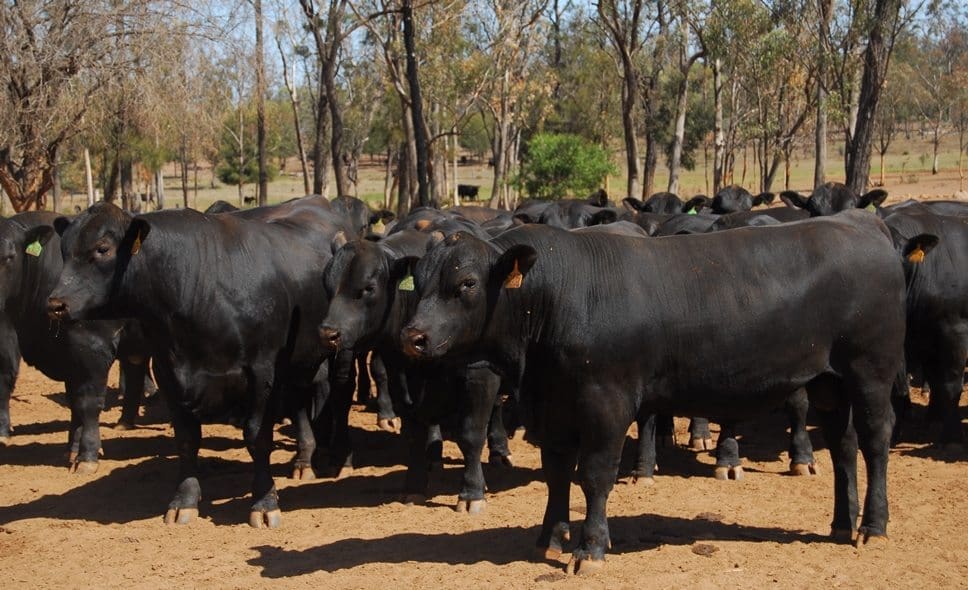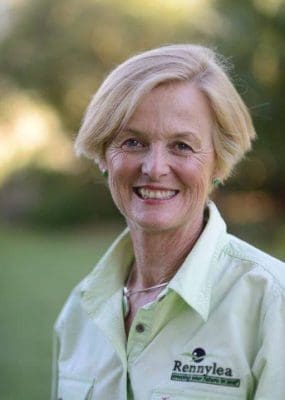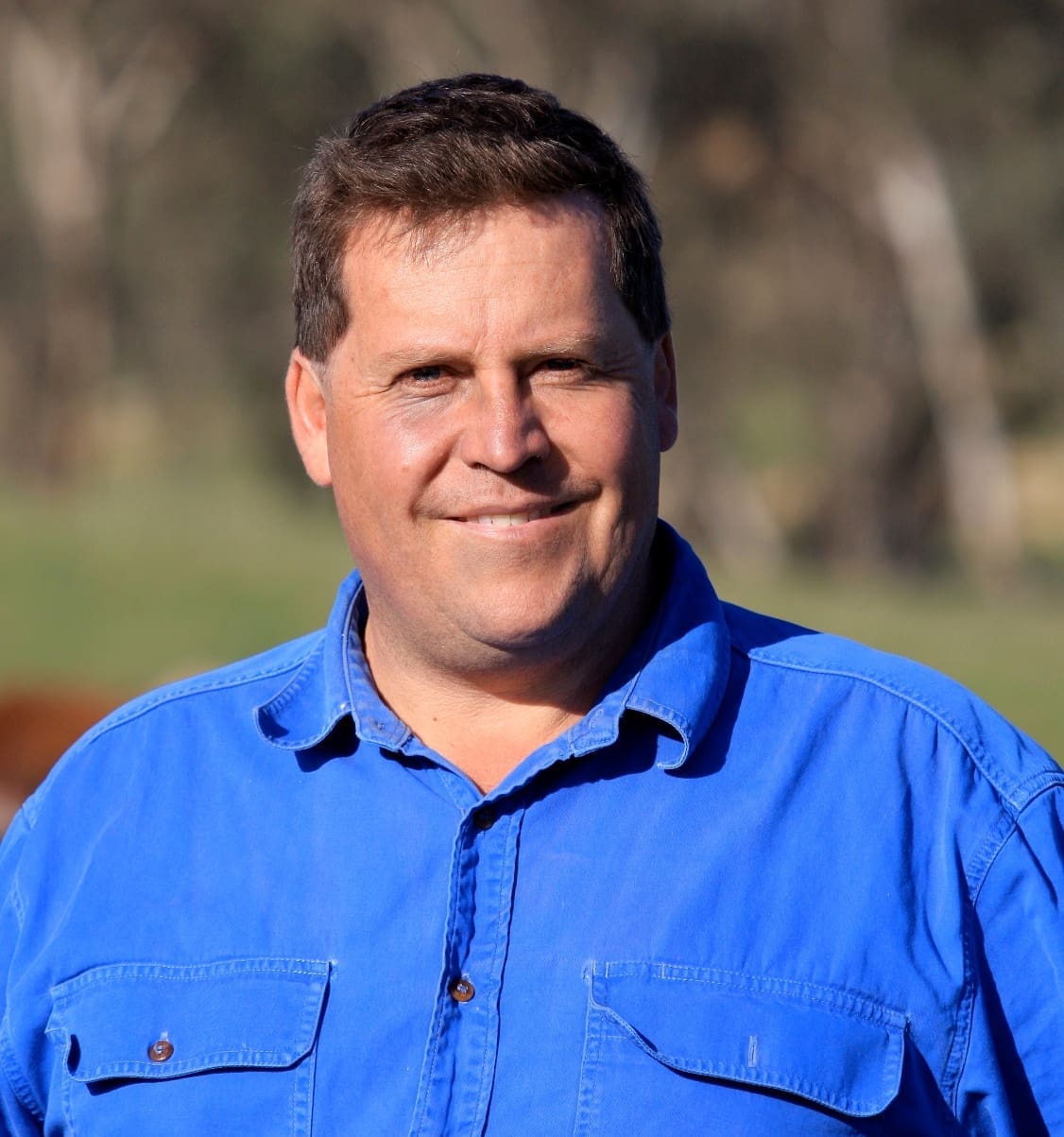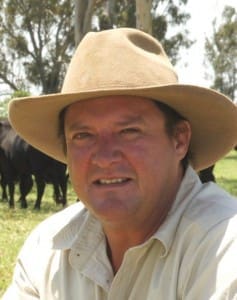
Yearling Angus bulls
CONTRACT breeding and supply of bulls has been a significant method of selling for more than 20 years for Rennylea Angus and Wirruna Poll Hereford studs, both based in southern NSW.
Most commonly used to supply herd bulls to large commercial beef herds in northern Australia, contract bull breeding is also used for some larger herds in southern Australia.
In simple terms, there is a contractual arrangement established between the bull breeder and the commercial breeder to supply a given number of bulls on an annual basis, within a set of specifications. Typically the agreements are five-year forward contracts which specify numbers of bulls to be supplied and the genetic and physical specifications they must meet.
About 25 percent of the 1000 bulls sold each year by the Rennylea Angus stud in southern NSW are for contracted breeding programs.

Lucinda Corrigan, Rennylea Angus
“We have been supplying 30 to 70 bulls each year to Crown Point Pastoral Co (originally Costello Holdings) in the Northern Territory on contract since 1997, and we have a number of other long term contract clients both in the north and the south,” Rennylea principal, Lucinda Corrigan said.
Crown Point Pastoral Co runs about 6000 Angus and Angus cross breeders as well as 3000 Poll Hereford breeding cows on 28,000sq km of country 450km south of Alice Springs in the Northern Territory.
Crown Point director, Donny Costello, selected bulls on key Estimated Breeding Values (EBVs) such as above average growth, good carcase traits including above average fat depth and he wants low milk EBVs, so that the cows can survive and get back in calf while rearing a calf in the region’s low rainfall pastoral conditions, Mrs Corrigan said.
“We send Donny a list of bulls that we think will suit him, and he selects the bulls he wants based on their EBVs. Part of the contract is that all bulls are assessed for structural soundness by an accredited assessor, and that they undergo a veterinary check for reproductive soundness,” she said.
Rennylea had had to be ‘flexible’ with the numbers of bulls Crown Point takes because of the huge seasonal variability, but most contracts were for fixed numbers. The bulls are trucked to New Crown in May, when aged 15-18 months, so that they can acclimatise before joining the following summer.
“The advantage of contract breeding is that it is known business, and of course it is less expensive to sell the bulls because we do not incur the costs of cataloguing and advertising for sale,” Mrs Corrigan said.

Ian Locke, Wirruna Poll Herefords
Holbrook breeders Ian and Diana Locke of Wirruna Poll Herefords also sell about 25 percent of their annual bull sales on a forward contract basis. They engaged in their first contract in the mid 1990s.
“We are now in the fifth, five year contract with our longest standing client, Crown Point Pastoral Co in the Northern Territory,” Ian Locke said.
“We’ve found we build great relationships with our contract clients, and get to understand their requirements very closely – which helps us fine-tune where required over time. However you must know the client and his requirements very well for contract bull breeding to work. It is always good to visit the contract breeding herds and understand their breeding goals and the conditions they are breeding their cattle under,” Mr Locke said.
He said contract bull breeding was very helpful when he became involved in the Wirruna herd because it gave a platform for a base-level of bulls, allowing the stud to grow its breeder numbers.
“We have contract clients as far north as the Northern Territory, but also some clients much closer to home” Mr Locke said.
Most contract clients did not come to inspect the bulls, but had quite specific requirements, such as below average birthweight EBV, above average fat depth EBV, a muscle score of C+ or better, and an eye hooding score of four or better. In one case a client requires a minimum of 34cm scrotal size at 13 months of age.
“All of our bulls are service ability-tested and assessed for reproductive soundness by our veterinarian and given structural soundness scores by an independent structural soundness assessor” Mr Locke said.
“Typically, for a client that requires 20 bulls under contract, we might send a list of 27 bulls which have passed the service ability-test and structural soundness assessment that we consider suitable, from which they can pick their 20 most suitable bulls.
“Early on, we were sending the bulls off at about 14 months of age but particularly for northern Australia we find it better to send them at 17-18 months, when they are a bit heavier and it is easier to assess structural soundness. Also they are better to miss the hot Central Australian summer before beginning to acclimatise.
“We have one client with multiple properties who likes to put the new yearling bulls out with his cows for the last two weeks of joining, so that they can be exposed to the various underlying diseases or bugs that may exist in the herd. They are then ‘disease acclimatised’ or vaccinated for the next joining season,” he said.
Crown Point Director, Donny Costello said that contract buying made his bull procurement job very easy.
“The majority of our bulls purchased come from a few select seedstock producers who are at the cutting edge of the industry, compared to multiple bull sales scattered around the country,” he said.
“The alliance formed over time while dealing with the same seedstock producers is a very important part of the process, as both parties learn to understand each other’s business, allowing new contracts to be better than the last, because both parties learn to give & take,” Mr Costello said.
“We have been dealing with both the Corrigans and the Lockes for 20 years, and more recently with Lisgar Droughtmasters (Robert Rea) at Home Hill, in North Queensland.”

Nick Cameron, Nindooinbah
A different example of contract breeding is where large breeding operations contract seedstock producers to breed bulls of a particular breed content, usually to go into a composite breeding program. In the past the Australian Agricultural Co contracted southern and northern seedstock producers to breed Senepol X Charolais bulls for use in their composite breeding program.
The Nindooinbah seedstock operation based at Beaudesert Qld was one of the operations contracted to breed Senepol X Charolais bulls for AA Co. Nindooinbah now specialises in Ultrablacks (80 percent Angus and 20 percent Brahman) but also breeds composite bulls and heifers with a different Angus and Brahman content on a contract basis.
Nindooinbah Manager, Nick Cameron, said that about 20 percent of the 500 bulls they sell per year are produced on a contract basis where the desired breed content is specified.
Negotiating a price
So how do the respective parties arrive at a price under contract breeding agreements?
In Ian Locke’s example at Wirruna, he said in all cases, the agreed price for contract-bred bulls was less than that achieved at auction – but there were cost savings in avoiding feeding and numerous other costs associated with holding an auction sale.
“But also, there’s the certainty of the sale – we’re happy to take a certain sale price right now for contracted bulls, than a ‘maybe’ sale taking them to auction.”
In Wirruna’s case, the price is renegotiated as part of the contract, every five years.
“We sit down, I argue my case for what the price should be, based on what similar bulls have been making in my sale, and the general cattle market, and the client argues their case, based on them providing the certainty of a sale, and taking the bulls earlier.”
He said recent negotiations had simply indexed the previously agreed price to CPI over the new five-year term.
“Part of the benefit of the contract is the long-term known relationship,” Mr Locke said. “Prices will go up and down from year to year, but we want a long-term relationship with these people.”
In the program’s longest running contracts – now in years 20 to 25 – he suspected price had been ‘swings and roundabouts,’ over the years evening-out any unders or overs, over time.
But he warned that things could go awry in breeding contracts.
“I’ve done two contracts over the years that did not work out, because I did not totally understand the people and what they wanted, and they, in turn, did not totally understand our breeding program.”
“We prefer to engage in bull breeding contracts with people who have been buying our bulls for a long time, because they know our cattle, and they see it as a natural progression away from the auction system, once the relationship is established. That’s the best formula – the expectations on both sides are well matched.”



I worked in the Leachman Program in Montana in the 80’s, what a fantastic program! I’m keen to get back into the industry and develop a similar program in the North, using Genetics from across Australia.